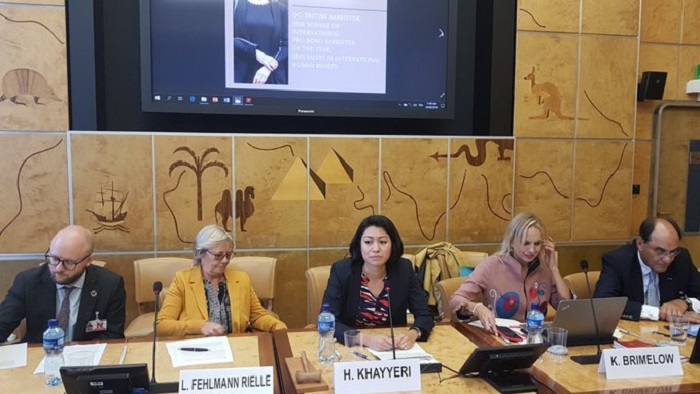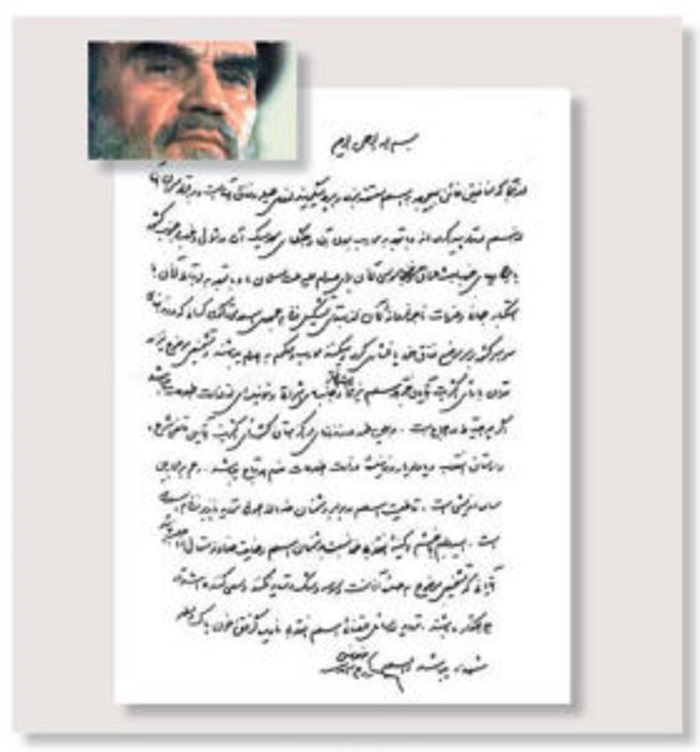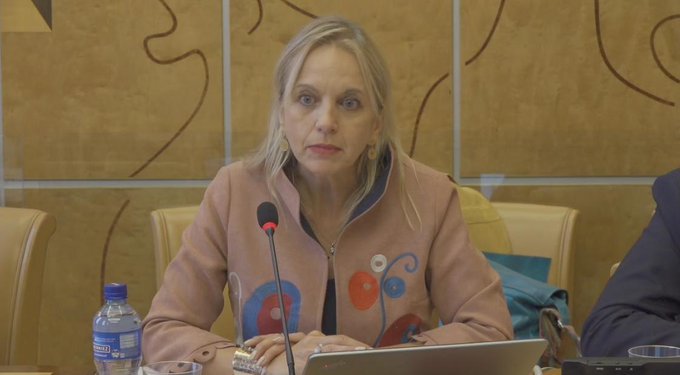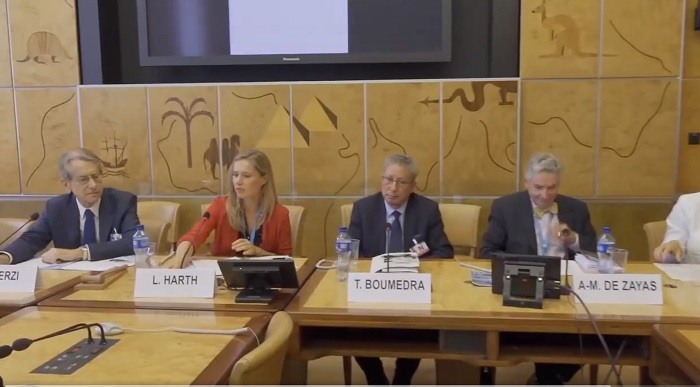
The panel of Human Rights Experts Criticize UN’s Failure to Investigate 1988 Massacre during a Conference held in Geneva Headquarters of the United Nations-September 20, 2019
During two conferences, International human rights experts called for an investigation into the Iranian regime’s human rights abuses at a conference at the United Nations headquarters on Friday. The wide-ranging panels of experts asked specifically for those responsible for the 1988 Massacre to be held accountable for their crimes against humanity.

In the summer of 1988, more than 30,000 political prisoners, most of whom were mujahedin-Khalq (PMOI/ MEK) members, were executed based on a fatwa issued by Ruhollah Khomeini, the then regime Supreme Leader, and were buried in mass graves.
Why an Investigation Is Imperative
During the first panel, international human rights lawyer Kirsty Brimelow, QC addressed the audience on why she thinks an investigation into the 1988 massacre is imperative. She asked:
“Why should there now be a tribunal on the crime against humanity committed in 1988? First, because lawyers have examined evidence and know beyond doubt that a crime was committed. If Iran disputes that, we have a process for that.”

Kirsty Brimelow International human rights experts called for an investigation into the Iranian regime’s human rights abuses at a conference at the United Nations headquarters
Optimism about the Future
Swiss MP Laurence Fellman Rielle expressed optimism that the campaign to hold the regime responsible for the 1988 Massacre is gaining traction.
“We are witnessing progress in seeing the perpetrators of this crime being brought before a court. Since launching the Campaign for Justice for the Victims of the 1988 Massacre, many of the perpetrators have been exposed and the crime has been documented,” he said.

In a conference organized by the Non-violent Radical Party, held at the Geneva Offices of the United Nations, the situation of human rights in Iran was discussed. Tahar Boumedra, former UNAMI chief, former UN expert, Alfred-Maurice de Zayas, and Giulio Terzi, former Foreign Minister of Italy were among the distinguished speakers. September 20, 2019
Human Rights Condition in Iran – Conference Held in the UN Headquarters in Geneva
During the second panel of experts, which was organized by the Non-violent Radical Party, Alfred-Maurice de Zayas, the former U.N. expert on the Promotion of a Democratic and Equitable International Order, also touched on the same subject, the 1988 massacre in Iran and explained:
” the full scope of the regime’s crimes and the failure of the U.N. to investigate. 30,000 human beings are only the tip of the iceberg. 120,000 of the MEK members have been killed. Back then Maurice Copithorne dropped the issue of the massacres because he thought it had already been dealt with by his predecessors,” he said.
“The High Commissioner for Human Rights and the Human Rights Council must investigate this crime against humanity. The Special Rapporteur on truth and justice, as well as the rapporteur on torture and arbitrary detention, must also look into this. This is a matter for the Human Rights Council and the UPR,” de Zayas added.
Alfred-Maurice de Zayas, fr #UN expert:“@UNhumanRights must investigate #1988Massacre.Special Rapporteur on truth &justice,as well as the rapporteur on torture &arbitrary detention must also look into this.This is a matter for the #HumanRights Council &the UPR.#NoImpunity4Mullahs pic.twitter.com/LrFTeNsFiJ
— NCRI-FAC (@iran_policy) September 20, 2019
Former Italian Foreign Minister Giulio Terzi was the guest speaker at the second conference, who also focused his speech on the 1988 massacre:
“Yesterday, the European Parliament condemned the Iranian regime’s human rights violations,” he said in reference to the cross-party early day motion used on Thursday. The heart and voice of Europe are expressed by human rights. Human rights must be a priority between EU institutions and the outside world. The EU has a fundamental role to promote freedom, rule of law, and protect freedoms,” he said.
“The [UN] Human Rights Council must discuss this. When we look at the geopolitical situation in the Gulf, there is no doubt that we must focus much more on human rights when we negotiate with Iran. Human rights and fundamental freedoms must come back to the center of this playing field,” he added.
https://twitter.com/iran_policy/status/1174998184193601537
Witnesses to the 1988 Massacre
Three women testified as witnesses to the regime’s extrajudicial executions and human rights abuses. They all suffered inhumane treatment in the regime’s prisons and lost family members to the 1988 Massacre and the regime’s extrajudicial executions.
One of the survivors, former political prisoner Massoumeh Joushaghani, said:
“I was a victim of the regime’s human rights violations. I want to know what the UN has done. This crime has been buried under the rug for 30 years. I am the voice of all my friends who were executed in 1988.
I want the UN to bring the perpetrators of the 1988 massacre, who are serving in senior positions in the Iranian government, to justice. The suffering of the families of victims continues.”
Amnesty International has been a leading voice in the campaign to expose what it has called a crime against humanity. Amnesty has emphasized that if the perpetrators of the 1988 Massacre are not made to account for their crimes before an international tribunal, more crimes and massacres will take place.
Staff Writer
